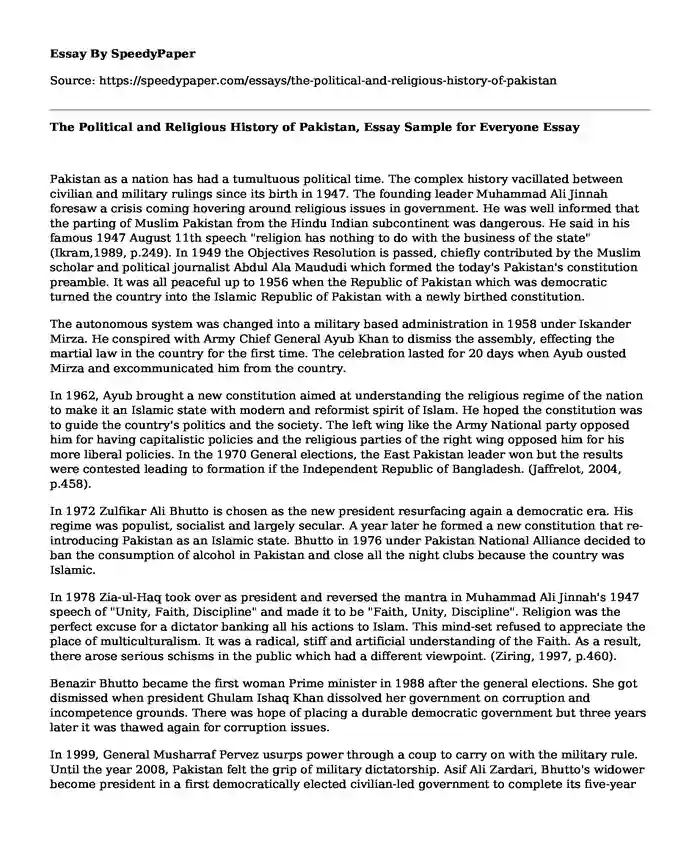Pakistan as a nation has had a tumultuous political time. The complex history vacillated between civilian and military rulings since its birth in 1947. The founding leader Muhammad Ali Jinnah foresaw a crisis coming hovering around religious issues in government. He was well informed that the parting of Muslim Pakistan from the Hindu Indian subcontinent was dangerous. He said in his famous 1947 August 11th speech "religion has nothing to do with the business of the state" (Ikram,1989, p.249). In 1949 the Objectives Resolution is passed, chiefly contributed by the Muslim scholar and political journalist Abdul Ala Maududi which formed the today's Pakistan's constitution preamble. It was all peaceful up to 1956 when the Republic of Pakistan which was democratic turned the country into the Islamic Republic of Pakistan with a newly birthed constitution.
The autonomous system was changed into a military based administration in 1958 under Iskander Mirza. He conspired with Army Chief General Ayub Khan to dismiss the assembly, effecting the martial law in the country for the first time. The celebration lasted for 20 days when Ayub ousted Mirza and excommunicated him from the country.
In 1962, Ayub brought a new constitution aimed at understanding the religious regime of the nation to make it an Islamic state with modern and reformist spirit of Islam. He hoped the constitution was to guide the country's politics and the society. The left wing like the Army National party opposed him for having capitalistic policies and the religious parties of the right wing opposed him for his more liberal policies. In the 1970 General elections, the East Pakistan leader won but the results were contested leading to formation if the Independent Republic of Bangladesh. (Jaffrelot, 2004, p.458).
In 1972 Zulfikar Ali Bhutto is chosen as the new president resurfacing again a democratic era. His regime was populist, socialist and largely secular. A year later he formed a new constitution that re-introducing Pakistan as an Islamic state. Bhutto in 1976 under Pakistan National Alliance decided to ban the consumption of alcohol in Pakistan and close all the night clubs because the country was Islamic.
In 1978 Zia-ul-Haq took over as president and reversed the mantra in Muhammad Ali Jinnah's 1947 speech of "Unity, Faith, Discipline" and made it to be "Faith, Unity, Discipline". Religion was the perfect excuse for a dictator banking all his actions to Islam. This mind-set refused to appreciate the place of multiculturalism. It was a radical, stiff and artificial understanding of the Faith. As a result, there arose serious schisms in the public which had a different viewpoint. (Ziring, 1997, p.460).
Benazir Bhutto became the first woman Prime minister in 1988 after the general elections. She got dismissed when president Ghulam Ishaq Khan dissolved her government on corruption and incompetence grounds. There was hope of placing a durable democratic government but three years later it was thawed again for corruption issues.
In 1999, General Musharraf Pervez usurps power through a coup to carry on with the military rule. Until the year 2008, Pakistan felt the grip of military dictatorship. Asif Ali Zardari, Bhutto's widower become president in a first democratically elected civilian-led government to complete its five-year term in office. For the first time in history, the country witnessed the executive completing their term peacefully, an index of growth in political stability in Pakistan. (Talbot, 2012, p.315).
Conservatism of Islamic ideologies is the overriding doctrine that has shaped Pakistan. The frequent and endless changes in government, intolerance to multiculturalism and political detention of leaders are symptoms of an unprincipled state. Making religion the core matter of state business is a recipe for destabilizing a country.
References
Ikram, S. M. (1989). History of Muslim civilization in India and Pakistan: a political and cultural history. Institute of Islamic Culture.
Jaffrelot, C. (Ed.). (2004). A History of Pakistan and its Origins. Anthem Press.
Talbot, I. (2012). Pakistan: a new history. Hurst.
Ziring, L. (1997). Pakistan in the twentieth century: A political history (pp. 460-61). Karachi: Oxford University Press.
https://www.bbc.com/news/world-south-asia-12966786
Cite this page
The Political and Religious History of Pakistan, Essay Sample for Everyone. (2022, Sep 05). Retrieved from https://speedypaper.com/essays/the-political-and-religious-history-of-pakistan
Request Removal
If you are the original author of this essay and no longer wish to have it published on the SpeedyPaper website, please click below to request its removal:
- Alternative Medicine Vs Modern Medicine Essay Example
- Essay Example on Minnesota Law
- China's Current Economic Situation Analysis - Essay Example
- Free essay about impacts of Technology and New Advancements in Nursing
- Free Essay. Christian Worldview and Ethics
- Essay Sample: Social Media Is the New Mobilizing Technique by Leaders
- Essay Sample on Cognitive Development: Piaget and Beyond
Popular categories





